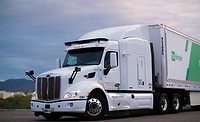Commercial vehicle leasing companies increasing EV, but diesel still dominates
Limitations with infrastructure and technology impact EV leasing status

Image courtesy of Penske
As the composition of beverage delivery fleets continues to rapidly change, the offerings from major leasing companies are evolving to keep pace with the modern market.
As you’d expect, electric vehicles (EVs) are becoming more of a presence in truck leasing inventories.
Penske, for example, has worked with a number of original equipment manufacturers (OEMs) to ensure that EVs are able to meet full-service leasing transportation needs. Among the vehicles included in what the company calls the Penske Truck Leasing EV Evaluation Fleet are Freightliner’s eCascadia and eM2, as well as its Custom Chassis MT50e class 5 and 6 walk-in; Volvo’s VNR, International’s eMV, Ford E-Transit and XOS class 6 walk-in. Two years ago Penske added 750 of the Ford E-Transits to its leasing fleet.
The most recent addition to its electric offerings — announced in May — is the P7-C EV from REE Automotive Ltd. The 16-foot, class 4 electric chassis cab has a gross vehicle weight of 16,000 pounds, a maximum payload of 6,000 pounds and a range of 169 miles.
Penske also has set up a network of high-speed charging stations in Southern California.
Another full-service leasing provider, Merchants Fleet, announced in its annual Impact Report that, in 2023, it grew its customers’ EV fleets by 65%. Merchants also notes that it has achieved 117% annual growth in the number of EV charging ports that it manages. Additionally, the company boasts a dedicated on-staff grant professional who works with customers to identify and obtain available grants, rebates and other incentives that help them bolster their EV deployments and investments in charging infrastructure. Last year alone Merchants secured $1.4 million in pre-approved incentives.
Meanwhile, PacLease, PACCAR’s truck rental and leasing unit, says it saw record truck deliveries in 2023 and expanded its footprint with 26 locations. Several of its locations now carry EVs and the company deployed electric Kenworth and Peterbilt vehicles in multiple new markets in 2023. The company adds that it plans to expand the number of EV deployments throughout 2024.
Yet, leasing giant Ryder System suggests, in its published report, “Charged Logistics: The Cost of Electric Vehicle Commercial Fleets,” that EV adoption among end users is still far from widespread. According to data that Ryder collected through its comprehensive analysis, the annual total cost to transport (TCT) for EVs versus diesel-powered trucks, is estimated to increase across commercial vehicle classes. That increase for light duty vehicles is projected to be around 5%, while, for a heavy-duty tractor, it’s expected to jump as much as 114%. For a mixed fleet of 25, light, medium and heavy-duty trucks the TCT could increase up to 67%.
Ryder continues to deploy EVs and charging infrastructure in areas most likely to benefit from it, but the company’s chairman and CEO Robert Sanchez has said that for many of its customers, the business case for converting to EV technology isn’t quite there yet — mainly due to the current limitations of the technology and the still relatively limited charging infrastructure.
The analysis also takes into account potential inflationary impact if companies were required to convert to EVs today. Based on the data for a mixed fleet of EVs including light-, medium- and heavy-duty trucks, conversion to an all-electric fleet could add a cumulative 0.5% to 1% to the overall inflation rate (assuming that those added costs are ultimately passed on to consumers).
Of course, with technology rapidly advancing, the gap between the cost to operate diesel vehicles and EVs will likely narrow in the coming years — especially since a 100% EV fleet is still a thing of the future for the beverage distribution market.
Looking for a reprint of this article?
From high-res PDFs to custom plaques, order your copy today!









